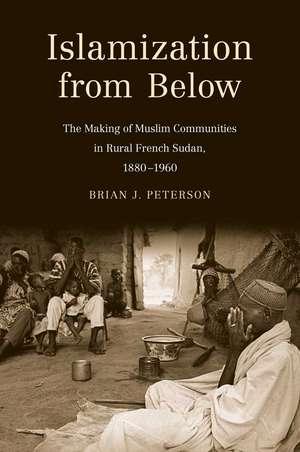Islamization from Below: The Making of Muslim Communities in Rural French Sudan, 1880-1960
Autor Brian J. Petersonen Limba Engleză Paperback – 26 apr 2011
Peterson rejects conventional interpretations that emphasize the roles of states, jihads, and elites in "converting" people, arguing instead that the expansion of Islam owed its success to the mobility of thousands of rural people who gradually, and usually peacefully, adopted the new religion on their own. Based on extensive fieldwork in villages across southern Mali (formerly French Sudan) and on archival research in West Africa and France, the book draws a detailed new portrait of grassroots, multi-generational processes of Islamization in French Sudan while also deepening our understanding of the impact and unintended consequences of colonialism.
Preț: 483.53 lei
Nou
Puncte Express: 725
Preț estimativ în valută:
92.52€ • 96.80$ • 76.86£
92.52€ • 96.80$ • 76.86£
Carte tipărită la comandă
Livrare economică 03-17 aprilie
Preluare comenzi: 021 569.72.76
Specificații
ISBN-13: 9780300152708
ISBN-10: 0300152701
Pagini: 336
Ilustrații: 3 maps
Dimensiuni: 156 x 235 x 22 mm
Greutate: 0.49 kg
Editura: Yale University Press
Colecția Yale University Press
ISBN-10: 0300152701
Pagini: 336
Ilustrații: 3 maps
Dimensiuni: 156 x 235 x 22 mm
Greutate: 0.49 kg
Editura: Yale University Press
Colecția Yale University Press
Notă biografică
Brian J. Peterson is assistant professor of history, Union College. He lives in New York City.
Recenzii
"A well researched and written narrative and analysis, Islamization from Below lives up to its promise of bringing new insight to the process by which Islam has become the majority religious practice of significant areas of West Africa. I do not know of any comparable works. His work should interest students and scholars of African and West African history, Islam and religious studies."—David Robinson, Michigan State University
“Peterson has produced an excellent study based on his probing of colonial documents and extensive use of oral testimony about the past. He underscores the sociological aspects of Islam's allure and the role of former slaves, retired soldiers, and labor migrants in the integration of Islam into the local religious heritage. The comprehensiveness of the analysis means that this work is a very significant contribution to the literature on colonial rule, with fine reconstructions of economic and administrative transformations.”—John H. Hanson, Indiana University
“One of the most important and inspired works on Islam in Africa.”—American Historical Review
